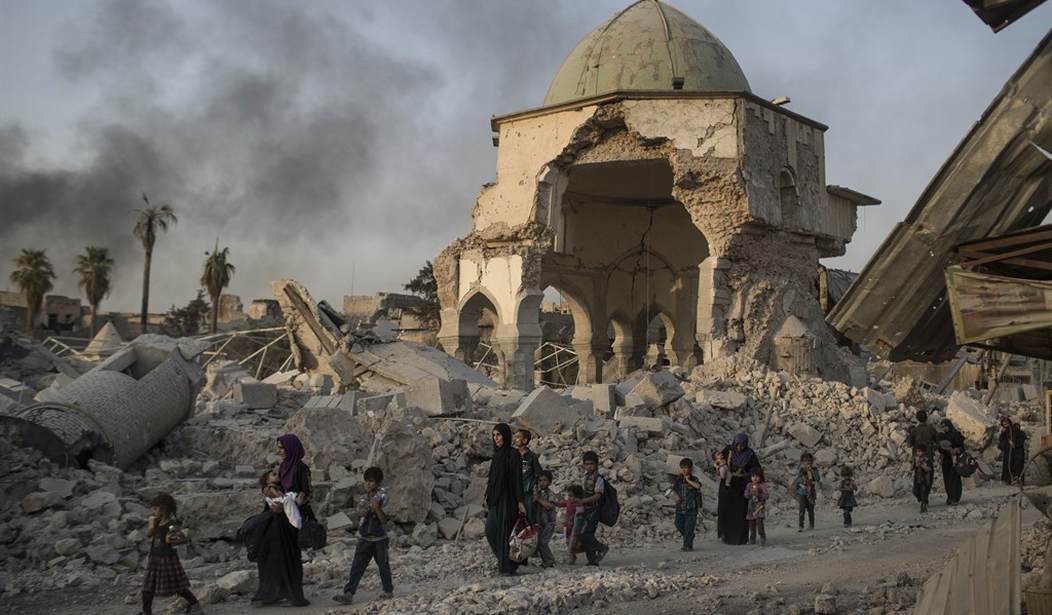Iraqi forces have already begun celebrating the liberation of Mosul on the banks of the Tigris, as the last lines of defense for ISIS have begun to collapse. Reuters reports that Iraqi television claims that the final declaration of victory over the terrorist group in Mosul will come in just hours. If so, it comes after nearly three years of darkness for Mosul and the Nineveh province:
Iraqi security forces expect to take full control of Mosul within hours as Islamic State’s defensive lines crumble in its former de facto capital in Iraq, military commanders said on Saturday.
Dozens of soldiers celebrated amid the rubble on the banks of the Tigris river without waiting for a formal victory declaration, some dancing to music blaring out from a truck and firing machineguns into the air, a Reuters correspondent said. …
A military spokesman cited by the TV said the insurgents’ defense lines were collapsing. Iraqi commanders say the militants were fighting for every meter with snipers, grenades and suicide bombers, forcing security forces to fight house-to-house in the densely populated maze of narrow alleyways.
How desperate have ISIS fighters become? Some tried to swim away in the Tigris, while others did what was once unthinkable:
“The battle has reached the phase of chasing the insurgents in remaining blocks,” the Iraqi military media office said in a statement. “Some members of Daesh have surrendered,” it added, using an Arab acronym of Islamic State.
ISIS morale may have finally been broken by the failure of a last-ditch effort to beat back the Iraqi military. A counter-attack launched yesterday fizzled out within hours:
The Islamic State mounted a counterattack in the flash-point city of Mosul on Friday, delaying the prospect of an imminent Iraqi victory, according to military officials.
Commanders said the militant group launched a wave of suicide attacks in the Old City around midday, threatening the government’s gains in an area that has become the Islamic State’s final redoubt in the city.
“They sent some suicide bombers today along with fighters, and our forces killed them all,” said Brig. Gen Shakir Rodhan of the army’s 16th Division, dismissing the pushback as “a normal thing in any battle.”
In the final straits of a siege in overwhelming numbers, almost any counterattack has some suicidal quality about it. In modern times, the closest parallel is Berlin in April 1945, where Nazi leaders cowered in bunkers while sending adolescent boys in futile attacks against the highly motivated and armed Red Army. In this case, though, ISIS’ suicide-bomber strategy was not only futile but actively counterproductive, as it guaranteed that they would collapse regardless of whether the suicide bombings themselves achieved their tactical goals. They gained ground for a brief period of time, but didn’t have the resources to hold it. It’s been clear for some time that the present Iraqi military coalition’s morale is high enough to overcome that terror tactic, and it turns out that ISIS’ military strategists don’t have the sophistication to craft any other approaches.
While a few of the ISIS terrorists have surrendered, Iraqi commanders expect most of the rest to fight to the death. They estimate that three-quarters of those left are foreigners who have little chance of slipping away to get back home, where they face long prison sentences or potentially worse. They’ve been left with a choice between forms of suicide. “They never surrender,” one general in the Iraqi Counterterrorism Service told the media. “Old Mosul will be their graveyard.” They certainly made it a graveyard for thousands of Iraqis over the last three years, so that may be the most fitting end outside of a noose for these ISIS terrorists.
Sky News discusses the significance the victory in Mosul will be, when it comes. “It can’t be overstated,” one analyst says, which is true in terms of turning the narrative of the caliphate against itself. It also can’t be overstated for the Iraqi military, which got routed by ISIS three years ago in Mosul, Fallujah, and other western cities. But once the city gets fully under Iraqi control, new questions will arise as to whether the government in Baghdad can control the aftermath when the Kurds, the Sunnis, and the Assyrian Christians begin making demands for restitution and economic restoration.








Join the conversation as a VIP Member